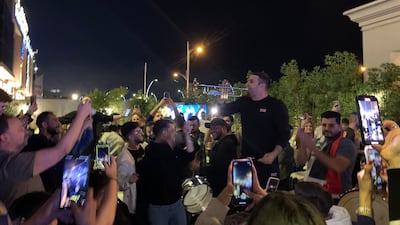Hundreds of Iraqi football fans gathered in Dubai’s coffee shops on Thursday night to watch their national team win 3-2 in the Arabian Gulf Cup against Oman.
When the final whistle blew, celebrations erupted into the streets of Jumeirah with dancing, flag waving, and shouts of "long live Iraq" ringing out into the air.
But according to some celebrators, it was never about the silverwear.
“The real victory for Iraqis was not about carrying the trophy," Mustafa Al Baldawi, 44, an Iraqi resident in Dubai, told The National.
"It is for the successful host of the cup [plus it] reduces the gap between Iraq and Gulf neighbours."
Thousands of GCC residents poured into Iraq to watch the game for the first time since 1979, which Mr Al Baldawi believes helped Arabs embrace Iraq again.
“We witnessed a great joy and a new strong bond between Iraq and the Gulf region. Seeing our brothers and sisters in Basra is the real joy for us. Iraq and the Gulf are one family,” he said.
Munaf Al Taee, 45, was among the Iraqi fans gathered to watch the match in a restaurant in Jumeirah.
When the game was won, Al Taee said a traditional Iraqi band with drums and trumpet started to play songs from home.
“The cup was a recovery as a footballing nation," Mr Al Taee told The National.
"Iraq is hosting the biennial regional competition for the first time in more than four decades after enduring wars, diplomatic isolation and instability.
“Hosting more than 500,000 football spectators in all matches proves Iraq is on the right track of recovery despite some flaws. Iraqis are close to the Gulf region, but in this cup we felt that we became closer.”
Due to security concerns, Iraq has played only two football World Cup qualifiers at home since the US-led invasion in 2003. One against Jordan, in 2011 in the northern city of Erbil, and the second against Hong Kong in Basra eight years later.
All other competitive games involving the national team have been played in the neighbouring countries such as Jordan, Qatar and the UAE.
Ali Adil, a Dubai-based resident said Iraqis needed to host this cup to put Iraq back on the map for something positive.
“I was hoping that hosting the cup would turn a new page in the Iraq's troubled history," he told The National.
"It represents a crucial step towards full national recovery as it will attract tourists and investment when they see how safe Iraq has become."
The eight-team tournament kicked off on January 6, bringing together teams from Iraq, Yemen and the six GCC states — the UAE, Saudi Arabia, Kuwait, Bahrain, Oman and Qatar.
It was the first time hosts Iraq have won the Gulf Cup for the first time since 1988 but the triumph was marred by a deadly crush outside the Basra International Stadium that killed at least two people and injured dozens.


